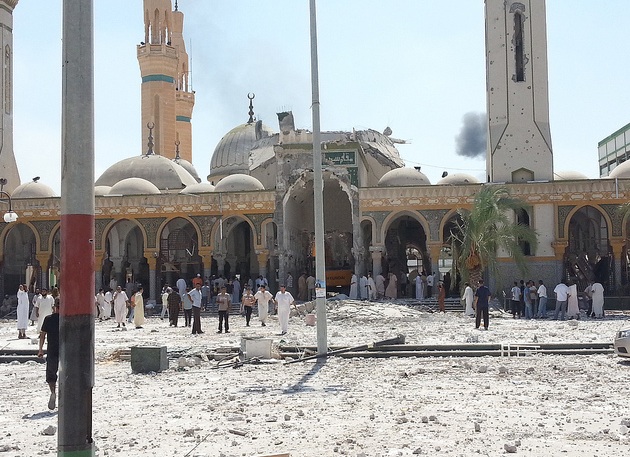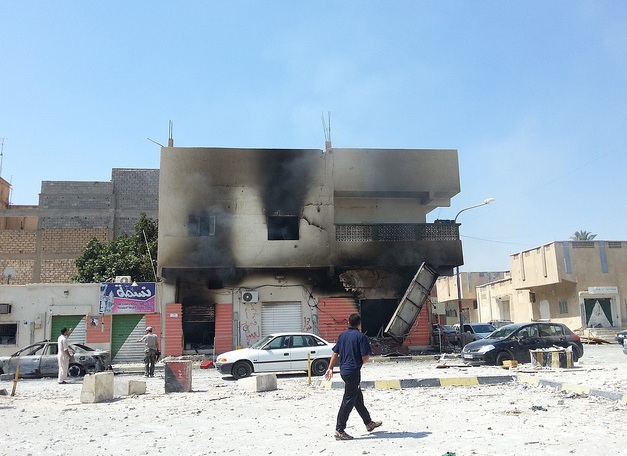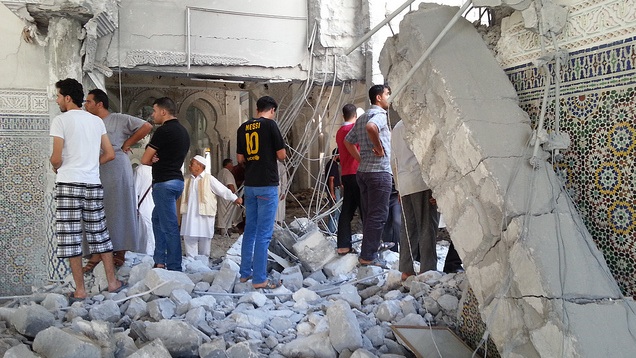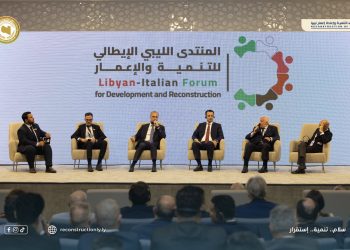By Umar Khan.

Tripoli, 26 August:
The tanks at the checkpoints set up right . . .[restrict]after Tripoli were enough to give away that something was wrong — as indeed there was. Only 15 kilometres outside Zliten, the town famous for its Sufi shrine, the sounds of distant explosions told people waiting in the long queues of cars at the last check point before Zliten what was happening. A fight was underway and with each loud explosion taking place fairly regularly its intensity was clear to everybody. The explosions came from a 106mm gun.
It was not until the small hours of the Friday morning that it was evident the clashes which had started as a tribal issue had engulfed the whole city.
The explosions increased and intensified after midnight and the sound of small calibre weapons were audible, like anti-aircraft weapons — compared to those of 106mm. The local radio stations in Zliten were broadcasting war-time programmes and blaming the chaos on Qaddafi supporters. It was reported that a green flag had been raised in the city centre and that the revolutionaries were now trying to clear the area. A warning was then issued that 100 tanks and hundreds of armed cars were on their way to Zliten in support of the Qaddafi forces with plans to seize the town. It turned out to be not true.

The radios were calling for all revolutionaries to come out and fight for the town. It was 2 a.m. Suddenly one of the stations switched to airing Takbeers on repetition whilst the other congratulated the people that reinforcements have arrived from Misrata and Tripoli. This too never happened.
The explosions kept happening at regular intervals through the night. The loudest took place around 5 a.m. on Friday morning, followed by another loud explosion 15 minutes later. A group of people in cars drove to a building nine kilometres west of Zliten — I was told it was a water plant — raided it and set it on fire. A petrol station was also set alight a few hours later in the same area.
Random explosions kept occurring after sunrise. The security officials then raided a compound where a building had been burned earlier. They kept shooting at the empty buildings and setting rounds towards the sea. They were, unintentionally, firing towards the part of the valley where some friends and I were camping. It lasted just about five minutes. We lay on the ground the whole time to avoid the bullets that were flying over our heads with the distinctive ‘whizzing’ sound.
The road towards Zliten was empty although there was some activity inside the city. Houses were bullet ridden, used shells scattered all around the area suggesting the intensity of the fighting that took place.
It had started as a clash between two branches of the local Awlad Al-Sheikh tribe following the killing of a man from one of the them. The tribe are descended from Sidi Abdel Salaam Al-Asmer whose shrine was the focus of Friday’s battle. Fighting escalated on Thursday to a fully-fledged gun battle involving heavy weapons after both sides called in allies from outside, some coming from Bani Walid. This angered locals and exacerbated the conflict. Meanwhile Salafists in Zliten were already involved in the conflict and used the chance to demolish the shrine.
Belonging to a Sunni school of thought that sticks to a strict interpretation of the faith, they view the idea of praying to saints and considering them holy as polytheism and the practices going on in such shrines as un-Islamic. The keeper of the Zliten shrine was also accused of black magic, however, no evidence was shown.
The dome in the main round-about, named after the marabout whose shrine was destroyed, was also destroyed.

The building with shops across from the shrine was totally burned and so was a mobile shop in an adjacent street. The streets were littered with used shells and debris, the houses were bullet ridden and there were two burned-out cars in front of the shrine. The holes in the walls suggested the use not only of 14.5mm anti-aircraft gun but the heavier calibre ones as well.
When the Salafists attacked the shrine and the dome in the square, heavy fighting took place but they were large in numbers — almost all the brigdades were involved in the demolition.
Speaking while efforts to exhume the body were ongoing, the fighters present at the shrine said that 16 people had been killed in the fight and that where they were was nothing less than a ‘frontline war’. This too may have been an exaggeration, although they faced stiff resistance from people trying to stop the demolition of the shrine.
The situation around the area of the Asmariya Islamic University complex which houses the shrine was all the more chaotic not only with the heavy presence of armed men but with several people visiting it. Their faces were grim and they recited prayers to make their discontent clear. There was a great deal of argument between the visitors and those demolishing the shrine although all ended with both sides saying “May Allah guide you to the right path” to the other.
The shrine was incorporated in the mosque. The fighters destroyed the dome by planting explosives on it and then the grave was destroyed by a jack hammer. The Salafists and their supporters tried to exhume the body in order to rebury it secretly so that there would be no longer be shrine in which to pray. They dug down five metres but did not find anything — and nothing has been said since about a body being found.
The mosque was also badly damaged, with the minarets sprayed with bullets and missing chunks of masonry. The building next to the mosque, said to be a library, was totally burned.
Until last week, the shrine was visited by thousands every month with people coming not only from different parts of Libya but from other countries. They used to seek blessings and offered sacrifices to have their prayers heard.
The Salafists had tried to attack the building earlier this year but were repulsed by local fighters and then agreed to have the issue decided upon by the Grand Mufti, Sheikh Sadek Al-Ghariani.
This time they succeeded because they did not give any time for the authorities to intervene. They also had the support of the local brigades who were present at the time of demolition, a crucial factor they lacked the last time.
The destruction of the Sufi shrine in Zliten was not the first of its kind in free Libya. According to reports it has been going on from early summer last year. The first shrine in Tripoli was demolished days after the fall of Bab-al-Aziziya. The demolition of shrines continued till earlier this year when a fatwa from the Grand Mufti halted it temporarily.
The events of Zliten, as expected, have emboldened Salafists elsewhere and the first blow came in the capital itself where the shrine in front of the Radisson Blu hotel was demolished on Saturday. The Sidi Sha’ab Mosque housing the shrine was very badly damaged and is likely to be leveled. The bodies from the two shrines on the same road as of the Sha’ab Mosque were also exhumed but the structure was left intact.
The destruction of the Sufi shrine in Tripoli is more controversial as it was carried out under the eye of official security agencies. The road was blocked by the police cars with dozens of policemen present. The move was immediately condemned by the head of the National Congress, Muhammed Magarief, who promised said that those responsible will be dealt with.
Surprisingly, the condemnations came almost two days after the shrine was demolished in Zliten. The incidents of Tripoli might have been avoidable, if the authorities had responded more quickly to the Zliten incident.
The deputy Prime Minister, Mustafa Abushagur, also condemned the incident calling it an act of crime and saying that those involved would be held responsible. However, given the state of security in the country and the fact that no criminal has so far been held responsible for any crime since liberation, it is understandable that some people have no fear of being held responsible for their acts or that they can feel nothing is going to stop them doing what they want.
Voices are now being heard belatedly saying that these incidents must serve as a wakeup call and that there needs to be an immediate crackdown on any unsanctioned activity in the country.
Umar Khan can be found on Twitter at www.twitter.com/umarnkhan
[/restrict]






